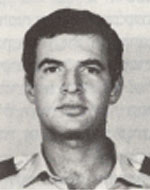Baruch, son of Shoshana (nee Hochman) and Dov, was born in Rehovot on July 11, 1951. Shoshana and Dov immigrated from Argentina two years earlier and were in Na’an with a training group of Kibbutz Kissufim, In the western Negev, where the family moved to Ramat-Yochanan, where Baruchi grew up and was educated in 1953. He studied at the Gush-Zevulun educational school and at the end of the 11th grade he was sent to participate in a summer camp for youth-science-seekers In Nahal Sorek. As a boy he would think, considerate, responsible and alert, interested in others and yet restrained and introverted. During his high school years, he actively participated in ideological circles and in the activities of the adult company. At the end of his studies, until his enlistment, he was appointed head of the school’s children’s society. Count on Baruchi – you knew you could. Many times they told him, “Baruchi, do not take everything so seriously!” But everyone who knew him knew that Baruchi also had a special, sharp and surprising humor, which was so typical of him. In conversations and debates Baruchi was listening, silent, and suddenly like a “whipping”, a funny flirtation, and the very thing, which would unfasten the tension and the hawks from their arms, and end a heated argument with loud general laughter. No less typical were his comments, brief and generally agreeable, and they were an interesting and not always accepted opinion. The faces of adolescence faced Baruchi and imprisoned deep within him, and in his own way he searched, groping and crystallizing his personality. During this period, he debated and drew sharp and human conclusions on the issue of national identity. At the age of sixteen, Baruchi traveled to Argentina for a family visit, and he had a profound experience that left a mark for years to come. Baruchi, who was impressed by the magnificent landscapes and the vast flowing water of a vast Argentina, narrowed Israel’s poverty in the water. From his meetings with the Jews of this diaspora, and especially with its young people, he remained under the heavy impression of their detachment from the Jewish world, and as an Israeli boy who cared, he began to reflect on the future relationship between the Jews of Israel and the Diaspora. As a subject for his thesis at the end of 12th grade, he chose to discuss the problems of adolescence in kibbutz society: “Did the group succeed in the socialization process of its construction?” Baruchi concluded that in the ideological-social- To create an affinity among young people in the past and, above all, to the origins of the Jewish people who had been abandoned by the founders, which in his opinion undermined the sense of self-worth of the young member of the group as a Jewish historical follower in this country. He was proud of his Jewishness, proud of being a “sabra.” Baruchi belonged to lovers of the country and knew its paths Baruch-Ari volunteered for the Israel Air Force in November 1969, and when he received the wings of the Israeli Air Force, Navot joined the Phantom Squadron, where he performed his duties and tasks, with a practical and thorough approach, and with the quiet and coolness that characterized him, and he was on active flights, and shortly before the war he was sent for training at the Flying School. . His ideas were expressed in his determination and stubbornness in doing things he wanted and believed in. And Baruchi knew what he wanted, though he always left an opening for reflection and self-criticism. When Baruchi grew up, he showed stability, balance and peace of mind. As a child, his sensitivity became subtle. And when he is mature, allow his “child” to peek, and sometimes go wild as an unbridled boy. To get angry, Baruchi knew only occasionallyVery distant he would lose his temper. But then, oh! He was filled with rage. His fists clenched in restraint, he looked like a fiery furnace fire, whose silence was heavy and thundering. With his feet on the ground, his head (not always …) in the clouds, Baruchi was guided by his solid and energetic actions, when his gaze looked at the essential, innocent, naughty nose in him. To the civilian life, Baruchi had other plans. He wanted to study psychology and dreamed of the “Moshinsky” house in the Jerusalem corridor. Baruchi spoke of his “mini-home-moshavnik”, “a multitasker,” with few crops in his hands, and many neighbors who are “old immigrants,” who still have a lot to do with their absorption. What he wanted and loved – he knew, and only dream was enough. During the Yom Kippur War, Baruchi participated in a large number of sorties in the north and south. On the eleventh day of the war, on the eve of Simhat Torah, on October 17, 1973, he and his crewman, pilot Gad Smok, went out to attack an Egyptian missile battery in the Suez Canal. Their plane, which was hit by a battery charge, was shot down and Baruchi was twenty-two years old. Gadi and Baruchi were not found, and as fighters whose place of burial is unknown, they are given a place, alongside their brothers, in the missing part of the military cemetery on Mount Herzl in Jerusalem. Baruchi was promoted to captain after falling in battle. He left behind a wife, parents, two brothers and a sister, and the memory of a Yaffa man at the beginning of his career, who proved his desire and ability to contribute, build and beautify our world. This fallen hero is a “maklan” – a hero whose burial place is unknown.
